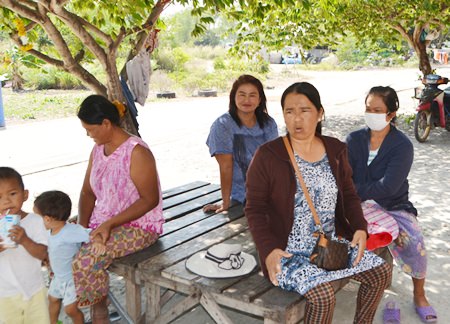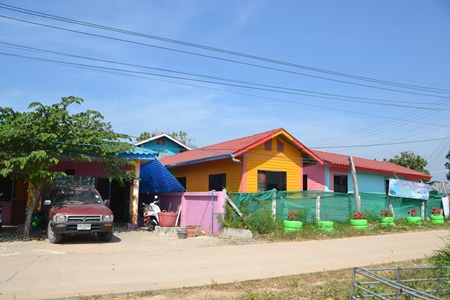Nongprue Sub-district officials last week conceded that months of negotiations have failed to persuade Lang Nern Community residents to allow a charity group caring for 35 HIV patients to remain in the Moo 3 neighborhood, leaving the financially strapped NGO no choice but to move.
Mai Chaiyanit, mayor of Nongprue, and Pramote Thaptim, secretary for the municipality, said they’ve talked with residents living near the Glory Hut Foundation shelter on Soi Chaiyapornwithi for three months, hoping to strike an agreement with those who claimed that having AIDS patients in their backyard posed both a safety risk for children and lowered their property values.
 Residents of Lang Nern Community voted 131-30 to evict the Glory Hut Foundation charity, requiring it to relocate within six months.
Residents of Lang Nern Community voted 131-30 to evict the Glory Hut Foundation charity, requiring it to relocate within six months.
In the end, both officials conceded, the residents wouldn’t budge. On Dec. 12, Lang Nern residents voted 131-30 to evict the AIDS group, requiring it to relocate within six months.
“If we have to leave, we don’t know where exactly to go. We don’t have enough money to rent any other place and cannot afford the daily expenses,” said Vichearn Bangsiri, advisor to Glory Hut for the past five years. “So it seems that we will have to start again from scratch. And even if we rent another location, we might be chased out again.”
Nongprue Mayor Mai said Tuesday that he has found a potential new site, but declined to elaborate, saying details were still being worked out.
Residents, meanwhile, remain steadfast about their decision, even in the face of scathing criticism and outrage leveled at them once news of the eviction became international news.
“People who claim that they can live together with people infected with AIDS should come here to experience it for themselves,” said Lang Nern Community President Jitlada Weluwan, 52, who acknowledged that neighboring community groups “are now looking at us like we’re beasts.”
She said there were multiple reasons residents voted to evict the foundation, including sewage problems, loud noise, and basic “dishonesty” about the group’s mission.
 The Glory Hut Foundation’s buildings and facilities, which were constructed with the support of government agencies, private sectors and various organizations, were built in the middle of an unforgiving neighborhood.
The Glory Hut Foundation’s buildings and facilities, which were constructed with the support of government agencies, private sectors and various organizations, were built in the middle of an unforgiving neighborhood.
“They moved into our community claiming they are here to teach English and music to children, so we thought it would be nice to have our children attend the classes,” she said. “But the foundation is not what we thought it was.”
Glory Hut moved to Lang Nern in July, renting a single home and two rai of property on a 6 million baht property for just 2,000 baht a month. The owner offered the property for practically nothing after learning about the NGO’s community work, which also includes providing English and music lessons, plus vocational training.
The move to Moo 3 village became necessary after Glory Hut lost 400,000 baht in annual funding from the Population Services International in the U.S. Its Thailand chapter works on HIV prevention, but has narrowed its focus to the O-Zone Drop-In Center it opened in Chiang Mai in 2003.
Glory Hut’s previous location on Nongmaikaen Soi 16 in Tungklumtaman near the Mabprachan Reservoir offered three buildings and cost up to 28,000 baht a month. It also received funding from area Rotary clubs and the Pattaya Sports Club.
The group got off to a good start with Lang Nern neighbors, who seemed eager to take advantage of the free music and English lessons. The foundation hosted a charity concert and expanded to build seven buildings on the property with hopes of eventually buying it and making Lang Nern its permanent home.
Then they took in 48 HIV and AIDS patients unable to stay at the full Prabaht Nampooh Temple and the HIV Center in Rayong. That’s when things took a turn for the worse. Neighbors claimed that, although Nongprue Sub-district officials knew all along Glory Hut cared for AIDS sufferers, they didn’t inform the community.
“The reason why they came here in the first place was unknown till now,” Jitlada said. “They should have came up front to talk or at least tell us about things and maybe we could’ve found a better solution.”
Things got worse as an inadequate sewage system caused wastewater constantly backing up and flowing down the street. Some even claimed the sewage smelled funny because it came from AIDS patients.
“There are elderly people and young children renting rooms here and they can’t bear the smell of the wastewater that comes streaming out of the foundation,” said Arom Duangdok, who owns a nearby apartment building. “Not to be selfish, but many people have moved out after having discovered that they are living too close to the foundation, afraid that their children would get too involved and catch the disease.”
Other residents complained about noise after dark, particularly barking dogs.
“Thai people are very superstitious and some believe the dogs are howling at the spirits of the deceased members of the foundation, which gives them the creeps,” said one disabled elderly resident living near the charity.
“Residents would often see cars that comes along to collect the dead bodies of the members of the Glory Hut who died of AIDS. They found it unacceptable, as there are many children living in the surrounding areas as well as sick elderly people,” Jitlada added.
“What if one of our kids went along and got involved with the people in the foundation?” asked apartment-house neighbor Chalao Nasisarai. “They even come out at night and wander around the streets!”
Faced with such opinion and opposition, the cash-strapped realizes it has to move.
“We can only ask now that we be reconsidered for support from government agencies, private groups or international organizations,” Vichearn said. “If we have to move, we are only going to move the patients away and not demolish the facilities because it was a big effort and it can be used as an office, and the rent price is affordable. The problem is that we do not know where to move the patients yet.”
“We hope this will be settled very soon,” Jitlada concurred. “They came into our community with no honesty in the first place and we think they should just go. We residents, of course, feel sorry for the people, but there are many who want them out for various reasons and the votes have decided the situation.”




